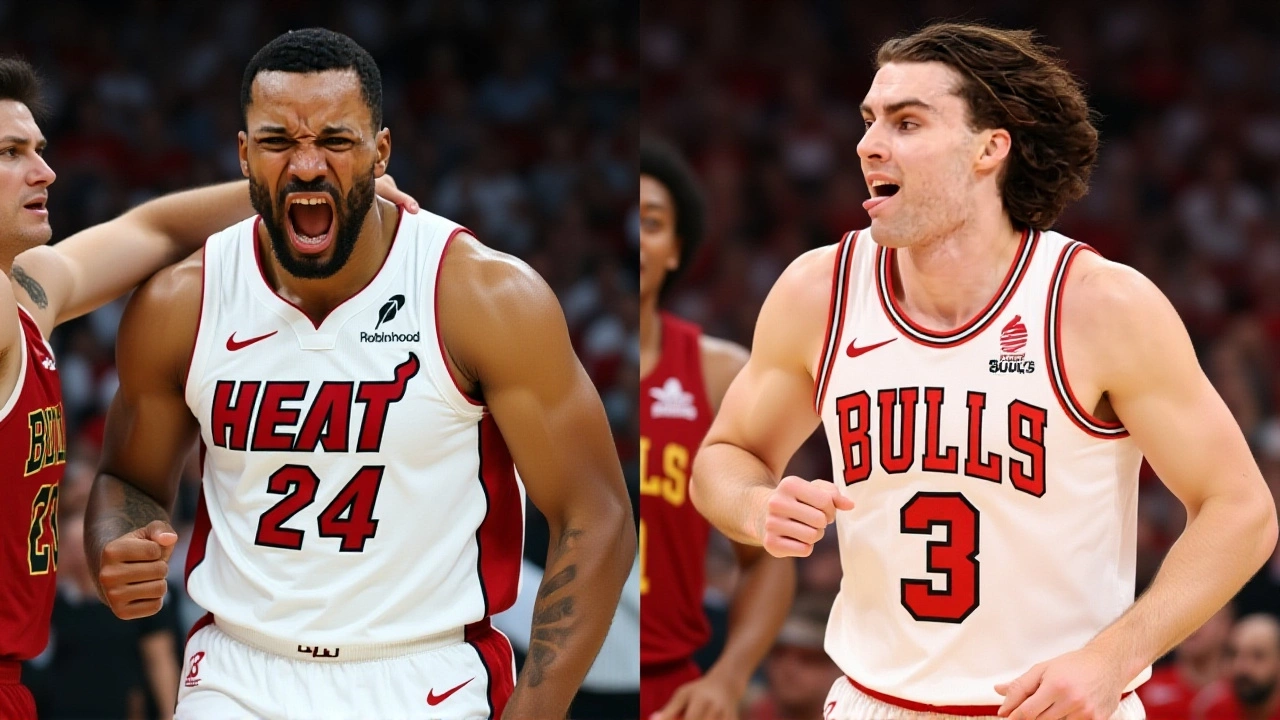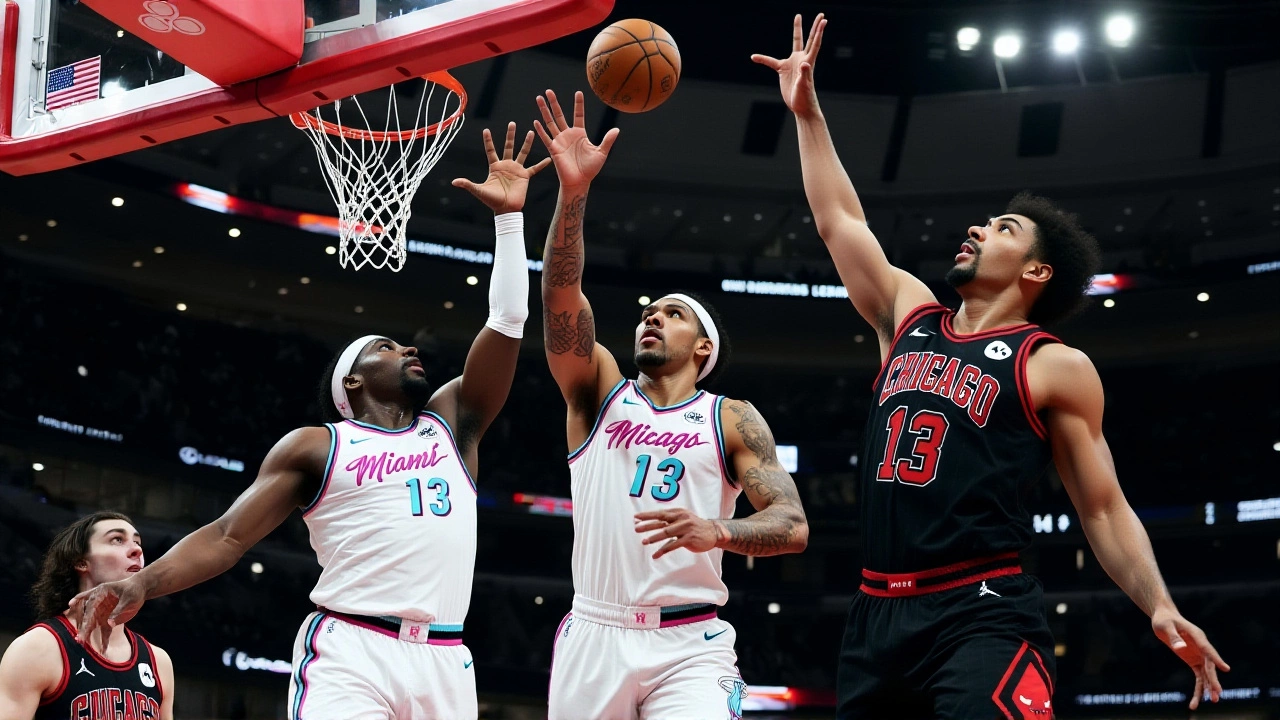The Miami Heat didn’t just beat the Chicago Bulls—they dismantled them. On Friday night, November 21, 2025, at the United Center in Chicago, the Heat rolled to a 143-107 victory in an Emirates NBA Cup Group C matchup, delivering their most lopsided win of the season and matching their entire 2018-2024 output for 140-point games in a single season. Led by rookie Kel'el Ware’s 20 points and 14 rebounds, Miami outscored Chicago by 36 points in the second quarter alone, turning what started as a competitive opener into a full-blown demolition.
A Second Quarter That Broke the Bulls
Chicago opened strong, racing out to an 18-11 lead in the first five and a half minutes. Fans at the United Center dared to hope—maybe this was the night the Bulls found their rhythm. Then came the Heat’s response. A 53-21 scoring burst over the next 12 minutes obliterated any momentum. By halftime, Miami led 78-53. The Bulls didn’t just trail—they were gasping. The margin never dipped below 14 points after that. At one point in the fourth quarter, the lead ballooned to 41 points, the second-largest of Miami’s season and the worst deficit Chicago had ever faced in 2025. For context, their previous worst was a 25-point loss to New York on November 2.
Kel’el Ware: The Rookie Who’s Not Acting Like One
At 20 years old, Kel'el Ware is playing like a veteran who’s seen it all. His 20 points and 14 rebounds weren’t just numbers—they were statements. He blocked shots, altered drives, and finished through contact like someone twice his age. He didn’t shoot often, but when he did, he made it count: 8-for-11 from the field. His presence in the paint forced Chicago to abandon its interior game, and his rebounding—especially on the defensive end—snuffed out second-chance opportunities. This was Ware’s third double-double in his last four games. The Heat haven’t had a rookie frontcourt player dominate like this since Hassan Whiteside in 2015.
Supporting Cast Steals the Spotlight Too
Ware didn’t do it alone. Norman Powell added 19 points off the bench, hitting four threes with crisp timing. Bam Adebayo quietly notched 18 points and seven assists, orchestrating the offense like a point guard in a big man’s body. Pelle Larsson and Davion Mitchell each chipped in 16 points, turning Miami’s depth into a weapon. The Heat scored 143 points—their fourth game over 140 this season. That’s as many as they had in the entire seven-year stretch from 2018 to 2024. Their average? A league-best 124.8 points per game. This isn’t luck. It’s a system clicking.

Chicago’s Night of Misfortune
For the Bulls, it was a perfect storm of frustration. Ayo Dosunmu led them with 23 points, and Josh Giddey nearly notched a triple-double with 19 points, 11 rebounds, and nine assists. But even their best efforts were drowned out. The real damage came off the court—or rather, in the locker room. Kevin Huerter was ejected in the third quarter after waving at the ball in frustration following a foul call. The ball bounced off referee Che Flores’ leg—a moment that looked like a tantrum, and was treated as one. Then came the injuries: Matas Buzelis left with a right ankle sprain, and Dalen Terry exited with a left calf strain. Both are questionable for Saturday’s game against Washington.
Where This Leaves the NBA Cup Standings
The win moved Miami to 2-1 in Group C, putting them half a game behind the Milwaukee Bucks for the top spot. The Bulls, now 1-2, sit in fourth—just behind the New York Knicks and ahead of the Charlotte Hornets. Every game matters now. The NBA Cup isn’t just a tournament; it’s a playoff seeding lifeline. Teams that finish top two in their group advance to the knockout rounds. Miami’s offense is firing. Chicago’s depth is fraying. And the clock is ticking.

What’s Next?
The Heat head to Philadelphia on Sunday, November 23, to face the 76ers—another playoff-caliber team with a top-five defense. Can they keep this scoring pace against a more disciplined opponent? The Bulls, meanwhile, host Washington on Saturday, November 22, with two key rotation players sidelined. If they lose, they’ll be two games behind the Knicks with only two games left in group play. The margin for error is gone.
The Bigger Picture: Why This Game Matters
This wasn’t just a blowout. It was a signpost. The Heat, once known for grit and defense, are now one of the most explosive offenses in NBA history. They’re averaging more points per game than any team since the 2018-19 Warriors. Meanwhile, Chicago’s rebuilding project is hitting a wall. They’ve got young talent—Giddey, Buzelis, Dosunmu—but no consistent scoring threat beyond them. And now, with injuries piling up, they’re running out of time to prove they’re ready for the next step.
Frequently Asked Questions
How does Kel'el Ware’s performance compare to other rookies this season?
Kel'el Ware is averaging 14.7 points and 9.8 rebounds per game this season, putting him in the top five among rookies in both categories. Only San Antonio’s Victor Wembanyama (18.2 ppg, 9.1 rpg) and Oklahoma City’s Chet Holmgren (16.5 ppg, 8.9 rpg) are averaging more points. But Ware’s efficiency—62.3% FG—is the highest among all rookies with over 15 minutes per game. He’s becoming the most reliable interior presence in the draft class.
Why is the Emirates NBA Cup so important this season?
The Emirates NBA Cup determines seeding for the play-in tournament. The top two teams in each of the four groups advance to a knockout bracket in December, with the winner earning a $1 million prize and, more importantly, a favorable position in the postseason race. Teams that win group games get bonus points toward their regular-season standings. Miami’s 2-1 record gives them a critical edge over teams like Chicago, who can’t afford to lose another group game.
What caused the Bulls’ offensive collapse in the second quarter?
Miami switched to a 2-3 zone defense that completely disrupted Chicago’s ball movement. The Bulls, who rely on isolation plays and pick-and-rolls, had no answer for the Heat’s length and rotations. They went 3-for-16 from three in the quarter and turned the ball over seven times. Meanwhile, Ware and Adebayo controlled the paint, forcing Chicago into contested mid-range jumpers they rarely make.
Is this Miami Heat team capable of making a deep playoff run?
With this offense, absolutely. They’re scoring at a historic rate, and their bench outscored Chicago’s 52-28. If they can maintain defensive discipline—especially in the playoffs—they have the depth to beat anyone. The key will be keeping Adebayo healthy and avoiding injuries like those suffered by Chicago’s Buzelis and Terry. Miami’s depth is their greatest asset, and they’re starting to play like a team that believes it can win it all.
What’s the significance of the United Center being the venue?
The United Center, home of the Bulls since 1994, is one of the loudest arenas in the NBA. Miami’s ability to dominate there, silencing a crowd of over 20,000, speaks volumes. Teams that win by 30+ in Chicago often go on to be serious title contenders. The Heat haven’t won by that margin in Chicago since 2012. This win isn’t just a statement—it’s a psychological turning point.
How does this result affect the Heat’s chances of securing home-court advantage?
Every win in the NBA Cup counts toward regular-season standings. Miami’s win gives them two additional points in the Eastern Conference standings, which could be the difference between the 4th and 6th seed. With the top six teams earning direct playoff entry, those half-game leads matter. If they finish in the top four, they avoid the play-in tournament entirely. That’s why this game wasn’t just about the Cup—it was about playoff positioning.
